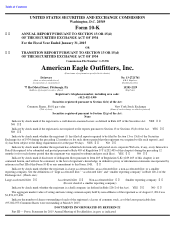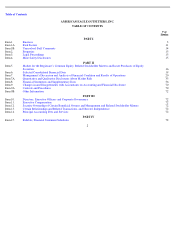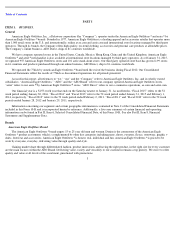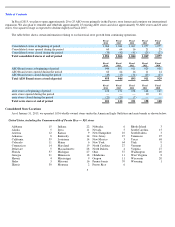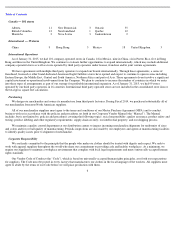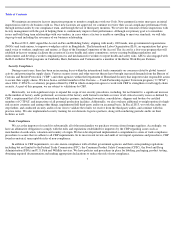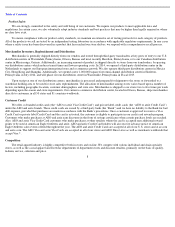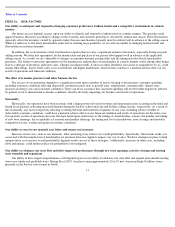American Eagle Outfitters 2014 Annual Report Download - page 7
Download and view the complete annual report
Please find page 7 of the 2014 American Eagle Outfitters annual report below. You can navigate through the pages in the report by either clicking on the pages listed below, or by using the keyword search tool below to find specific information within the annual report.
Table of Contents
We maintain an extensive factory inspection program to monitor compliance with our Code. New garment factories must pass an initial
inspection in order to do business with us. Once new factories are approved, we continue to review their social compliance performance both
through internal audits by our compliance team, and through the use of third-party monitors. We review the outcome of these inspections with
factory management with the goal of helping them to continuously improve their performance. Although our primary goal is to remediate
issues and build long term relationships with our vendors, in cases where a factory is unable or unwilling to meet our standards, we will take
steps up to and including the severance of our business relationship.
In Fiscal 2013, AEO signed the Accord on Fire and Building Safety, aligning with nearly 100 brands, non-governmental organizations
(NGOs) and trade unions, to improve workplace safety in Bangladesh. The International Labor Organization (ILO), an organization that gives
equal voice to workers, employers and unions, is Chair of the Steering Committee of the Accord. The Accord is a five-year program that will
establish in-factory training; facilitate the creation of factory health and safety committees; review existing building regulations and
enforcement; and develop a worker complaint process and mechanism for workers to report health and safety risks. AEO is also engaged with
the ILO on Better Work programs in Cambodia, Haiti, Indonesia and Vietnam and is a member of the Better Work Buyers Partners.
Security Compliance
During recent years, there has been an increasing focus within the international trade community on concerns related to global terrorist
activity and protecting the supply chain. Various security issues and other terrorist threats have brought increased demands from the Bureau of
Customs and Border Protection (“CBP”)
and other agencies within the Department of Homeland Security that importers take responsible action
to secure their supply chains. We have been a certified member of the Customs — Trade Partnership Against Terrorism program (“C-TPAT”)
since 2004. C-TPAT is a voluntary program offered by CBP in which an importer agrees to work with CBP to strengthen overall supply chain
security. As part of this program, we are subject to validations by CBP.
Historically, we took significant steps to expand the scope of our security procedures, including, but not limited to: a significant increase
in the number of factory audits performed; a revision of the factory audit format to include a review of all critical security issues as defined by
CBP; a requirement that all of our international logistics partners, including forwarders, consolidators, shippers and brokers be certified
members of C-TPAT; and inspections of all potential production facilities. Additionally, we also evaluate additional oversight options for high-
risk security countries and among other things, implemented full third-party audits on an annual basis. In Fiscal 2013, we took the audits one
step further, and conducted security audits of our own to validate the results we receive from the third-party audits, and continue with this
practice today. We also implemented security training for our domestic logistics partners, along with conducting periodic audits on their
facilities as well.
Trade Compliance
We act as the importer of record for substantially all of the merchandise we purchase overseas from foreign suppliers. Accordingly, we
have an affirmative obligation to comply with the rules and regulations established for importers by the CBP regarding issues such as
merchandise classification, valuation and country of origin. We have developed and implemented a comprehensive series of trade compliance
procedures to assure that we adhere to all CBP requirements. In its most recent review and audit of our import operations and procedures, CBP
found no material, unacceptable risks of non-compliance.
In addition to CBP requirements, we also ensure compliance with all other government agencies and their corresponding regulations
including but not limited to the Federal Trade Commission (FTC), the Consumer Product Safety Commission (CPSC), the Food and Drug
Administration (FDA) and U.S. Fish and Wildlife services. We have policies and procedures in place for labeling, packaging, product testing,
obtaining required documentation and making appropriate declarations to reduce the risk of non-compliance.
7

